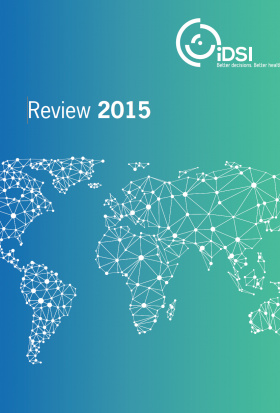This website uses cookies so that we can provide you with the best user experience possible. Cookie information is stored in your browser and performs functions such as recognising you when you return to our website and helping our team to understand which sections of the website you find most interesting and useful.
NICE International Review 2015

Details
INTRODUCTION TO THE YEAR’S EVENTS
2015 was our best year yet – a year that saw our international Decision Support Initiative (iDSI) grow from a fledgling enterprise to a trusted source of knowledge and support for those setting healthcare priorities.
With our iDSI partners in Thailand (HITAP), USA (CGD) and South Africa (PRICELESS) we’ve provided hands-on Practical Support to policy makers in India, China, Indonesia, Vietnam and South Africa as they set out and invest in their own priorities en route to sustainable, good quality Universal Healthcare Coverage (UHC).
Our work in India is informing the establishment of a Medical Technology Advisory Board and led to the launch of nationwide guidelines on non-communicable diseases (NCDs). The work attracted interest at the highest levels of government: in a joint statement on UK-India cooperation, UK Prime Minister David Cameron and Indian Prime
Minister Narendra Modi said they “welcomed … the collaboration between NICE International, UK and the Department of Health Research in India on medical technology assessment”.
With support from our academic partners we’ve added to our bank of Knowledge Products – cutting edge insights on best practice in health resource allocation. These include a series of papers by the University of York exploring the opportunity costs of investment in resource constrained settings and the implications of ignoring these costs, and a framework for considering capacity building in effective priority setting, which integrates the broad spectrum of activity and stakeholders involved. We’ve worked with the Bill and Melinda Gates Foundation, supporting them to adopt the iDSI Reference Case – a set of best practice principles in economic evaluations – to guide
their investment decisions. We held a workshop on knowledge transfer and exchange to explore how those with an interest in priority-setting can best support it and we’ve developed a robust Theory of Change and a Monitoring, Evaluation and Learning framework, to ensure iDSI has its intended impact.
In 2016-17, iDSI will begin its second phase, supported by an award of US$12.8m (£8.9m) from the Bill and Melinda Gates Foundation, including a contribution by the UK’s DFID, representing a major investment dedicated to making better decisions for better health. This will allow us to continue our existing work, reach new audiences and pursue innovative ideas for building capacity in priority-setting. With Mahidol University, we will launch Health Policy and Technology Assessment (HePTA), a graduate course across major South East Asian universities training researchers and policy makers to undertake and use priority setting research and we also hope to strengthen our partnerships with global funders to build on their legacy of strengthening health systems in poorer countries.
Through all of this, we will continue to work with leading UK government and academic institutions to strengthen the UK’s offering to fellow policy makers across Africa and Asia.




